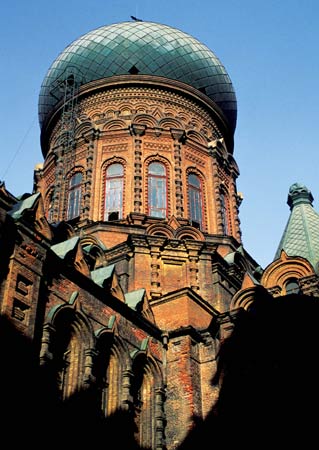| Zdravstvuyte, China |
| http://www.sina.com.cn 2005/07/14 20:09 thats China |
 St.Sophia church in Harbin, a landmark of Russian architecture in China No longer Russia's "little brother," China still enjoys the culture of its Russian minority By David Eimer No one knows exactly how many foreigners there are living in China. In Beijing alone, estimates range from up to 50-100,000 people. It's easy though, to find the expats. Just wander through the bars and restaurants of Sanlitun in Beijing, or the night clubs in Shanghai's former French concession, and you'll find people from Europe, North and South America and Australasia mixing together in a way that wouldn't happen in their home countries. In China, the common bond of being a laowai is enough to override mere nationality. That though, doesn't apply to the Russian community, the foreigners with the closest and deepest ties to China. From Harbin in the north to Macau in the south, as far west as Yining in Xinjiang and in all the major eastern cities, there's a Russian presence that, in some cases, dates back hundreds of years and which is distinctly different from the other foreign communities in China. It's the result of a shared history that no other country can match. The British, French and Americans might have run Shanghai as their own personal fiefdom, the Germans had Qingdao and a whole host of countries divided Tianjin between them, but, along with the UK's occupation of Hong Kong and the Portuguese in Macau, it's hardly something to be proud of. The Bund in Shanghai might look spectacular when it's lit up at night, but it was built with the profits from the opium trade and it's a reminder of a time when China existed only to be exploited by the colonial powers. No one should be surprised that the Avenues of the French concession were swiftly re-named after 1949 (the creation of the People's Republic of China), or that it's only the tourist trade that has led the Chinese to preserve the European-style buildings in the other old Treaty Ports. But many Chinese cities have a monument or building that was a gift from the old Soviet Union to China in the Fifties, a period when the USSR was China's only ally. They stand as testimony to a relationship that's been difficult and uneasy at times, but always more equal than the dealings China has had with the rest of Europe and America. For Russians who live and work in China, that has obvious benefits. "I like the attitude of the people in Beijing, they're very friendly and I can't say that about my own city, Moscow," says Natalia Karelova, who went to school in Beijing and now manages the Traktirr Restaurant there. "When you talk to the older generation, they try and remember the Russian they were taught in school. There was an expression in China years ago that 'Russia is our older brother'. Now it is 'Russia is our friend'. China isn't the younger brother anymore, but the people are still friendly." After returning to Russia to study at Moscow University, Karelova chose to come back to Beijing because of its more affable atmosphere. "There are plenty of opportunities to make money in Russia, but I don't feel comfortable living there. I have the feeling that this is much more my home. It's like when I'm in the taxi coming back from the airport here, I feel like 'Oh, I'm back at home'. I don't feel like that in Moscow. I go there to do stuff I can't do here and then I'm back on the plane." But the vast majority of Russians who come to China now do so for work and,although a group of Russian Orthodox priests who arrived in 1684 as missionaries can claim to be among the first Russian residents in China, it has always been that way. The key date is 1897, when construction on the China Eastern Railway, designed to link the Russian Far East to Northern China and now known as the Trans-Manchurian Railway, began. There were already Russian traders in Harbin, many of them Jews escaping the pogroms of Tsarist Russia, but it was the building of the railway, which ran south from Vladivostock through Harbin to Dalian, that transformed Harbin from a sleepy village on the banks of the Songhua Jiang River into a boom town. Thousands of Russians arrived to work on the railway and not even the Russo-Japanese War of 1905, which saw the Japanese push Russia out of Port Arthur (now Lushun), and take over control of much of the south of northeast China, could halt the city's rapid expansion. |
| 【评论】【论坛】【收藏此页】【大 中 小】【多种方式看新闻】【下载点点通】【打印】【关闭】 |